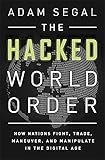The hacked world order : how nations fight, trade, maneuver, and manipulate in the digital age / Adam Segal.
Publisher: New York : PublicAffairs, 2016Description: ix, 306 pages.Content type: text Media type: unmediated Carrier type: volumeISBN: 9781610394154.Subject(s): Internet and international relations| Item type | Current library | Class number | Copy number | Status | Date due | Barcode | |
|---|---|---|---|---|---|---|---|
| Book | House of Lords Library - Palace Dewey | 327.10285 SEG (Browse shelf(Opens below)) | 1 | Available | 014766 |
"A Council on Foreign Relations book."
The hacked world order -- The anatomy of cyber power -- Guardians of peace, little green men, and the electronic armies of the future -- Breaking things and the search for order -- Everybody spies -- The battle over data: security, privacy, and trade power -- Let slip the Twitter followers of war: information, ideas, and legitimacy -- Geopolitics strikes back: nation-states and the politics of internet governance -- After Pax Digital Americana.
"The internet today connects roughly 2.7 billion people around the world, and booming interest in the "internet of things" could result in 75 billion devices connected to the web by 2020. The myth of cyberspace as a digital utopia has long been put to rest. Governments are increasingly developing smarter ways of asserting their national authority in cyberspace in an effort to control the flow, organization and ownership of information. In A Hacked World Order, Adam Segal shows how governments use the web to wage war and spy on, coerce, and damage each other. Israel is intent on derailing the Iranian nuclear weapons program. India wants to prevent Pakistani terrorists from using their Blackberries to coordinate attacks. Brazil has plans to lay new fiber cables and develop satellite links so its Internet traffic no longer has to pass through Miami. China does not want to be dependent on the West for its technology needs. These new digital conflicts pose no physical threat-no one has ever died from a cyberattack-but they serve to both threaten and defend the integrity of complex systems like power grids, financial institutions, and security networks. Segal describes how cyberattacks can be launched by any country, individual, or private group with minimal resources in mere seconds, and why they have the potential to produce unintended and unimaginable problems for anyone with an internet connection and an email account. State-backed hacking initiatives can shut down, sabotage trade strategies, steal intellectual property, sow economic chaos, and paralyze whole countries. Diplomats, who used to work behind closed doors of foreign ministries, must now respond with greater speed, as almost instantaneously they can reach, educate, or offend millions with just 140 characters. Beginning with the Stuxnet virus launched by the US at an Iranian nuclear facility in 2010 and continuing through to the most recent Sony hacking scandal, A Hacked World Order exposes how the internet has ushered in a new era of geopolitical maneuvering and reveals the tremendous and terrifying implication on our economic livelihood, security, and personal identity." Council on Foreign Relations website.
